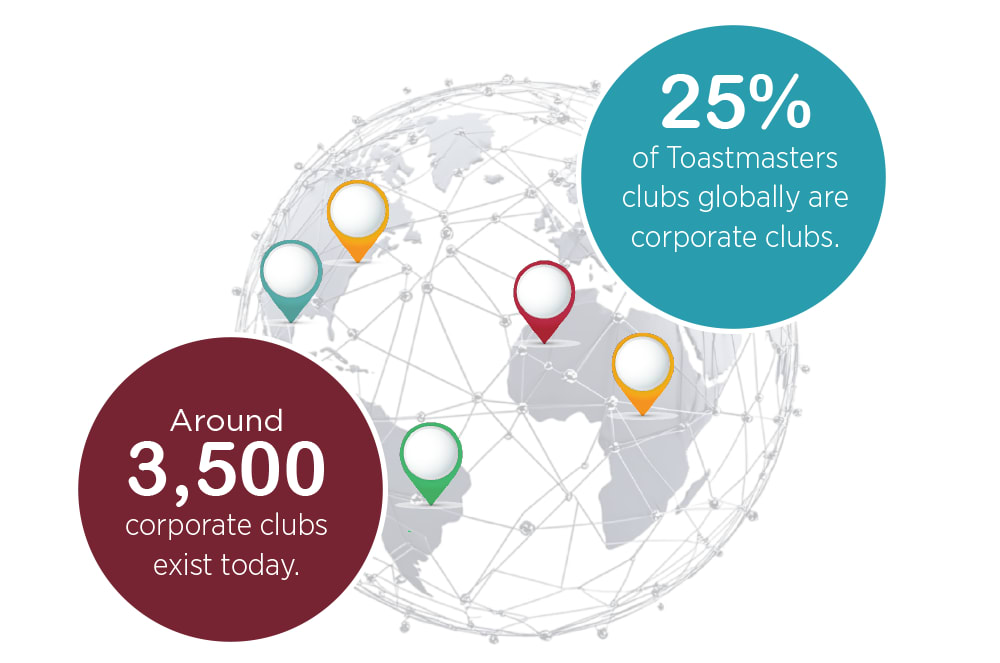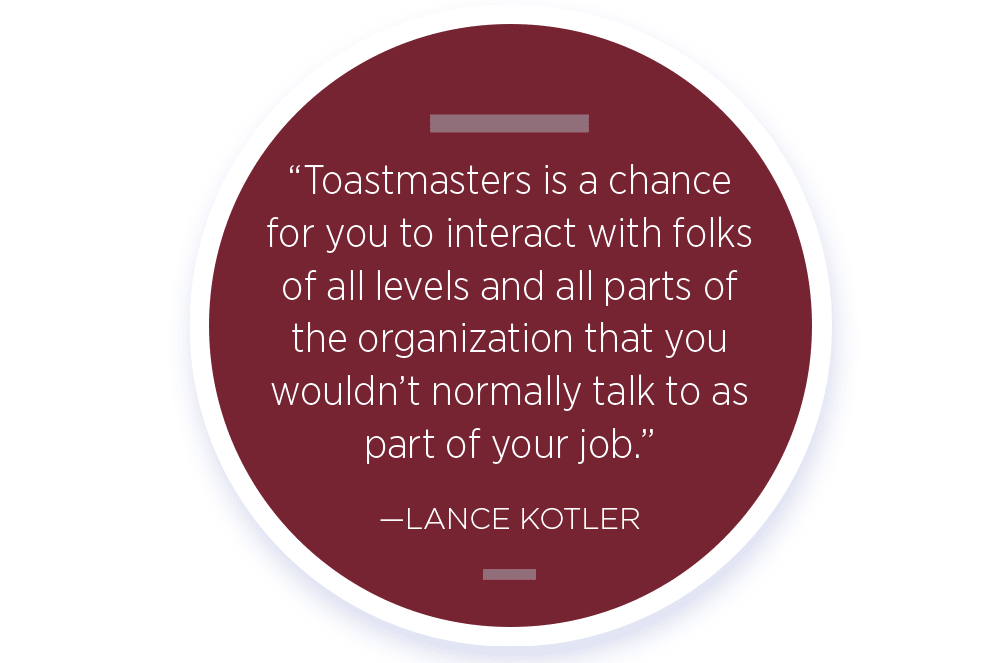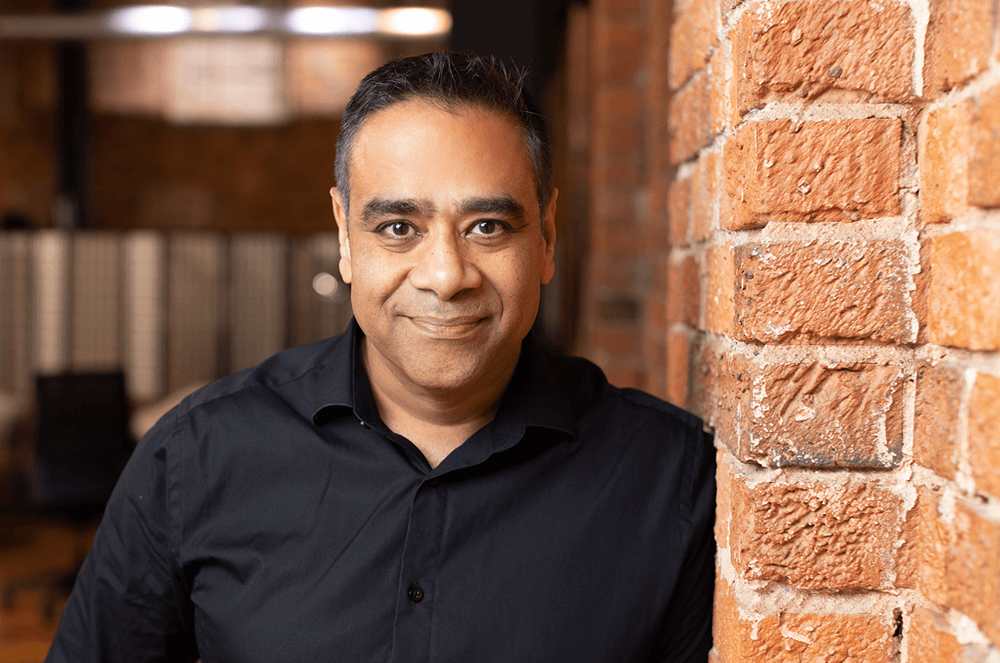
Around the world, leaders of corporate Toastmasters clubs are finding novel approaches to expand the reach, reputation, and ranks of their clubs, largely by partnering with executives and influential managers.
A prime example: At BNY, an international financial services firm, the nine corporate Toastmasters clubs co-sponsored a global open house headlined by the company’s CEO himself.
The event attracted more than 2,000 attendees online and in person at BNY’s New York City headquarters. Talk about having the support of top leadership!
The Corporate Element
Corporate clubs have long been an integral part of Toastmasters. Around 3,500 corporate clubs are chartered today, and they comprise close to 25% of Toastmasters clubs globally, according to the World Headquarters Research and Analysis Department.
Corporate clubs provide a space where participants can build critical workplace skills outside of their core job responsibilities. Members come for the speaking and leadership development, but they stay having also built their time-management and active-listening skills, along with their ability to tactfully deliver and graciously receive impactful feedback.
“This is the opportunity to practice those transferable skills that stand us in good stead when we’re in social circumstances, when we’re in work meetings, when we’re [conducting] interviews,” says Past International President Pat Johnson, DTM, the go-to guru on corporate clubs in Toastmasters.
Business Benefits
Unlike community clubs, corporate clubs typically have built-in advantages such as free meeting spaces, remote-meeting and conference-call technology, and learning and development budgets that not only cover membership dues but also everything from photocopies to food.
Far from being for the stuffy-and-suited with speeches limited to “shop talk,” corporate clubs offer their members a place to be creative and take risks without the possibility of missing a sales goal or botching a critical project. Club meetings offer a break from the norm, with job titles dropped at the door.
“Toastmasters is a chance for you to interact with folks of all levels and all parts of the organization that you wouldn’t normally talk to as part of your job, or be in touch with as intimately,” says Lance Kotler, a vice president at BNY and the Vice President Membership of BNY Mellon Toastmasters in New York City.
Indeed, Kotler’s own network now extends to the company’s CEO, Robin Vince. It all started when another member of the club happened to mention Toastmasters to Vince. Think real-world Table Topics®. Only this didn’t end with applause but an invitation to visit the club.
After further discussions with staff and club leadership, the visit from Vince was turned into a Q&A led by Vice President Education Gouri Mukherjee, a director at BNY. Vince shared valuable insights about his approach to public speaking, such as consistently improving by seeking input on each performance.
“He’s media trained, he does [public speaking] all the time. He has so much exposure and practice,” explains the club’s President, Laura Sullivan, a vice president at BNY. “One of the things he was saying was, always ask for feedback and have that open feedback loop.”
The event was so impactful that within a week, the host club in New York City had 24 new member applications and was fielding interest from employees in other locations who were considering chartering their own clubs. The New York City club has also continued to host other BNY executives in a similar format, most recently featuring the chief financial officer.

Documenting Success
Stephen Krutzfeldt, DTM, a Minnesota-based technical consultant, chartered DocuSign SE Toastmasters online in 2022 to build on his prior growth in another corporate club. His idea to start the club didn’t exactly catch fire. In fact, recalls Krutzfeldt, several of his remote peers joined at the outset just to support him.
However, within two years, several of those club members, now stronger speakers and leaders, ended up being promoted to new roles at DocuSign. The common thread of Toastmasters participation did not go unnoticed by executives, who had observed Krutzfeldt presenting certificates and ribbons to members when the company had occasional in-person work events for the all-remote teams.
Krutzfeldt’s own impromptu speaking muscles were put on display when he was asked to give executives a brief unplanned overview of Toastmasters. It went well enough that they asked for a formal meeting to learn more and explore expanding the Toastmasters corporate program across the division.
“It was all sort of word of mouth there at first and it just compounded,” he says.
In 2025, following a plan designed by Krutzfeldt, DocuSign added 120 solution consultants across the United States as members of the DocuSign club. Because the group is so large, these 120 members are divided into six sub-groups that meet twice a month and periodically as a full club. The idea is that these additional participants will remain in the program at least until they each complete Level 1 in Pathways.
“It was a great exercise to be able to basically package up the idea, identify what are the [key performance indicators] that our leadership team is looking at and how Toastmasters would align with them, and then pitch that,” Krutzfeldt says.
So far, all of the participants have completed their Ice Breaker speech and many have completed their second speech. Some were apprehensive before it began, telling Krutzfeldt that they didn’t need help with public speaking or it wasn’t a required skill for their role.
But many of them have now changed their tune. Not only are they getting to know each other as individuals outside of their jobs, he says, but they are also bonding as a group and creating a buzz about the organization in internal work chats and social media posts.

Joining at John Deere
A trusted recommendation was how Sushil Pawar, DTM, first learned about Toastmasters. One of his graduate business school professors at the Indian Institute of Science, Bangalore, in India, challenged every student to join Toastmasters and treat it as an executive leadership program.
It took him four years to follow the advice and join a club. But once he joined the John Deere Pune Toastmasters Club in India, he became a quick believer. “To speak like a leader, you need to have your communications pace, speech, and volume be moderated, as well as pinpointed to the situation that you are in,” Pawar notes.
As he developed his leadership abilities, Pawar observed that the club was growing too large to accommodate the number of members looking to connect with others during the isolating early days of the pandemic. Pawar, now District 125 Director and a product manager at another company, used his time at John Deere to advocate for forming what eventually became three additional clubs under the same corporate umbrella. And as Club Growth Director in 2023–2024, he chartered 22 clubs, the majority of them corporate.
Toastmasters has strong brand recognition in India, Pawar adds, so he finds that most corporate decision-makers have heard of it. Still, he says it helps to present them with a value proposition rather than relying on qualitative selling points such as increased confidence or improved time management.
Toastmasters is an organizational win, but corporate clubs need a strong internal supporter to not only push for the program, but to also convince managers to allow for dedicated time for the club. Pawar has seen companies that supported charters and sponsored memberships initially, but then struggled to provide the long-term backing needed to keep the program going.

Corporate Toastmasters “are employees first and members later,” Pawar says. “We need to make sure that this becomes part of their employment. Integrating Toastmasters into the work culture helps employees see its value as part of their professional growth, making the time investment more natural and rewarding.”
But if companies do understand this and commit to a Toastmasters program, benefits abound for employers and employees alike.
At DocuSign, notes Krutzfeldt, several of the original club members are now taking leadership roles in their District.
“They’re Toastmasters, do or die. All day long,” says Krutzfeldt, who himself served as a Division Director. “They’ve been great advocates.”
Emily Sachs, DTM is a freelance writer in Brooklyn, New York. She is the Immediate Past District 119 Director and is a regular contributor to the Toastmaster magazine.
Related Articles

Professional Development
The Corporate Club Value Proposition: Stronger Than Ever

Your Turn



 Previous
Previous

 Previous Article
Previous Article